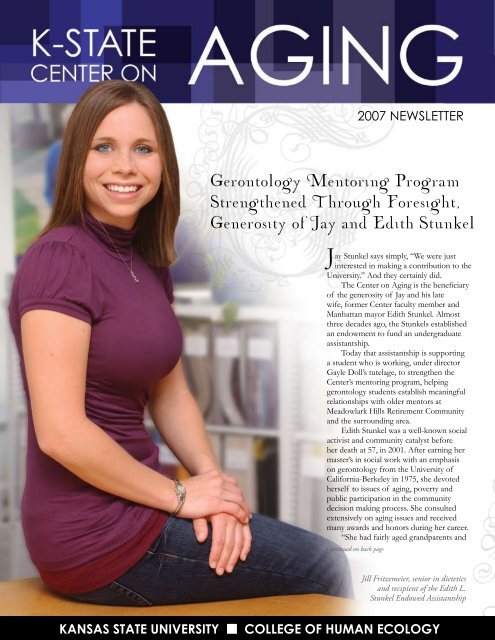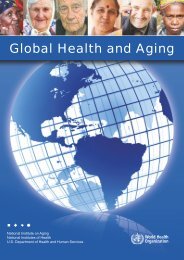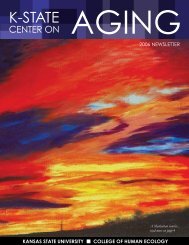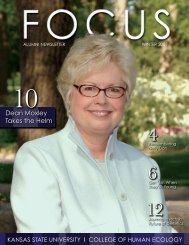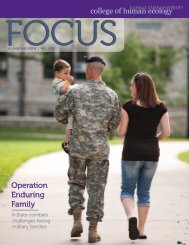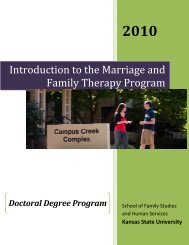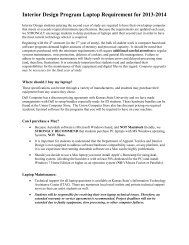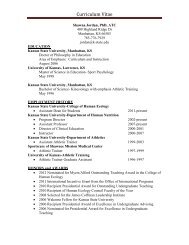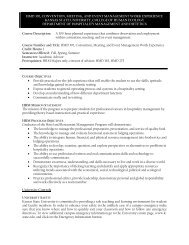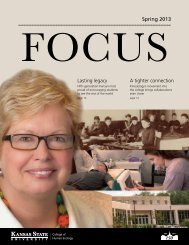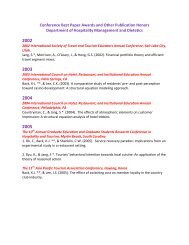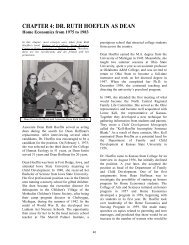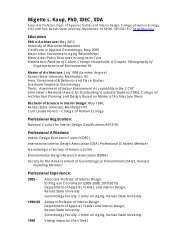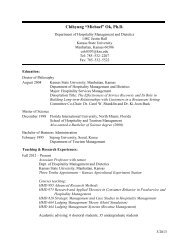2007 - College of Human Ecology - Kansas State University
2007 - College of Human Ecology - Kansas State University
2007 - College of Human Ecology - Kansas State University
Create successful ePaper yourself
Turn your PDF publications into a flip-book with our unique Google optimized e-Paper software.
<strong>2007</strong> NEWSLETTER<br />
Gerontology Mentoring Program<br />
Strengthened Through Foresight,<br />
Generosity <strong>of</strong> Jay and Edith Stunkel<br />
Jay Stunkel says simply, “We were just<br />
interested in making a contribution to the<br />
<strong>University</strong>.” And they certainly did.<br />
The Center on Aging is the beneficiary<br />
<strong>of</strong> the generosity <strong>of</strong> Jay and his late<br />
wife, former Center faculty member and<br />
Manhattan mayor Edith Stunkel. Almost<br />
three decades ago, the Stunkels established<br />
an endowment to fund an undergraduate<br />
assistantship.<br />
Today that assistantship is supporting<br />
a student who is working, under director<br />
Gayle Doll’s tutelage, to strengthen the<br />
Center’s mentoring program, helping<br />
gerontology students establish meaningful<br />
relationships with older mentors at<br />
Meadowlark Hills Retirement Community<br />
and the surrounding area.<br />
Edith Stunkel was a well-known social<br />
activist and community catalyst before<br />
her death at 57, in 2001. After earning her<br />
master’s in social work with an emphasis<br />
on gerontology from the <strong>University</strong> <strong>of</strong><br />
California-Berkeley in 1975, she devoted<br />
herself to issues <strong>of</strong> aging, poverty and<br />
public participation in the community<br />
decision making process. She consulted<br />
extensively on aging issues and received<br />
many awards and honors during her career.<br />
“She had fairly aged grandparents and<br />
Continued on back page<br />
Jill Fritzemeier, senior in dietetics<br />
and recipient <strong>of</strong> the Edith L.<br />
Stunkel Endowed Assistantship<br />
G
Greetings<br />
from<br />
the<br />
Center!<br />
Gayle Doll, director, Center on Aging, with Steve Shields,<br />
CEO, Meadowlark Hills Retirement Community<br />
Just a few weeks ago I had the pleasure <strong>of</strong> presenting Steve<br />
Shields, a graduate <strong>of</strong> our long-term care administration<br />
program, with the <strong>2007</strong> <strong>College</strong> <strong>of</strong> <strong>Human</strong> <strong>Ecology</strong> Public<br />
Advocacy Award. I don’t know how it would be possible to<br />
find a more worthy recipient. Steve is nationally known in the<br />
field <strong>of</strong> long-term care for promoting innovative methods<br />
for enhancing the quality <strong>of</strong> life for frail elders. Within the<br />
last year, his organization, Meadowlark Hills Retirement<br />
Community, has been featured on the CBS evening news.<br />
Recently he has been asked to coordinate efforts to rebuild<br />
the long-term care system in Ireland. The Center continues<br />
to benefit from our ongoing, strong partnership with Steve<br />
and Meadowlark Hills.<br />
In this issue <strong>of</strong> our annual newsletter, you’ll read about<br />
benefactors as well as Center on Aging faculty and students<br />
who are as committed as Steve is to the well being <strong>of</strong> our<br />
aging population. Jay Stunkel and his wife, former faculty<br />
member Edith Stunkel (who died in 2001), endowed an<br />
undergraduate assistantship that is currently supporting a<br />
project to strengthen the Center’s mentoring program for<br />
gerontology students.<br />
László Kulcsár is figuring out how smaller communities<br />
can thrive while attracting a large number <strong>of</strong> elderly<br />
residents. Sally Bailey is studying the health benefits for older<br />
people when they participate in the arts. Oscar Dodek is, at<br />
76, the oldest master’s student we’ve ever had. After a long<br />
career in medicine and law, he’s obviously going for “wear<br />
out, don’t rust out” as he jumps into his first experience with<br />
online learning.<br />
We know many <strong>of</strong> you have contributed much to the<br />
field <strong>of</strong> aging. Please let us know how you’re applying your<br />
gerontology education to your career or daily life. Take a<br />
second right now to email us at gerontology@k-state.edu.<br />
Maybe you could be our next award-winning graduate!<br />
Pr<strong>of</strong>ile <strong>of</strong><br />
a Lifelong<br />
Learner<br />
Distinguished new gerontology<br />
student plunges in with gusto<br />
What do you plan to do in your retirement For Dr. Oscar<br />
Dodek, a 76-year-old, board-certified reproductive<br />
endocrinologist, gynecologist and obstetrician, attorney, and<br />
pr<strong>of</strong>essor emeritus at George Washington <strong>University</strong>, the<br />
answer to this question was obvious: Go back to school.<br />
In August, Dodek began the most recent chapter <strong>of</strong> his<br />
academic career. He started work on a master <strong>of</strong> science degree<br />
via the multi-university gerontology program <strong>of</strong>fered by K-<strong>State</strong><br />
and the Great Plains Interactive Distance Education Alliance.<br />
The gerontology master’s program represents a<br />
collaboration among six Midwestern universities, including<br />
Iowa <strong>State</strong>, North Dakota <strong>State</strong>, Oklahoma <strong>State</strong>, Texas Tech,<br />
Missouri and K-<strong>State</strong>.<br />
Courses are geared toward working pr<strong>of</strong>essionals, and all<br />
take place over the Internet. The program attracts students<br />
from across the U.S. and caught the attention <strong>of</strong> Dodek, who<br />
felt a personal affinity for the topic.<br />
“Besides being an occupant <strong>of</strong> the demographic group in<br />
question, I have a lot <strong>of</strong> friends and family in this age group,
“The fact that I sit in the corner <strong>of</strong> my son’s old bedroom and<br />
go to school, it’s just amazing to me. It really is an interesting<br />
process and, I think, a very effective way <strong>of</strong> teaching.”<br />
— Oscar Dodek<br />
and to learn about them I thought would be fascinating,” he<br />
explained. “I love to learn, so the whole process is very exciting<br />
to me.”<br />
Dodek developed his love <strong>of</strong> learning as a child, growing<br />
up in Washington, D.C., where he decided early on to follow in<br />
his uncle’s footsteps and study medicine.<br />
“I was going to be a doctor, and I didn’t know what<br />
kind, but I knew I was going to be a doctor right from the<br />
beginning,” he said. “Even in my high school yearbook, it said I<br />
was going to be a doctor. There was no question.”<br />
He went on to earn a Bachelor <strong>of</strong> Arts from the <strong>University</strong><br />
<strong>of</strong> Michigan and a Doctor <strong>of</strong> Medicine from George<br />
Washington <strong>University</strong> in 1956. Dodek accepted a fellowship<br />
at the Worcester Foundation for Experimental Biology in 1963<br />
and studied adrenal function in the experimental group that<br />
tested the first birth control pill.<br />
Among other distinctions, Dodek has served as clinical<br />
pr<strong>of</strong>essor in obstetrics and gynecology and clinical pr<strong>of</strong>essor<br />
in steroid biology at George Washington <strong>University</strong>, as well<br />
as co-chair <strong>of</strong> George Washington <strong>University</strong>’s Division <strong>of</strong><br />
Reproductive Endocrinology.<br />
As for his current academic pursuits, Dodek is without<br />
question the elder <strong>of</strong> his gerontology program cohort. However,<br />
this is not the first time he has occupied the role <strong>of</strong> nontraditional<br />
student. At age 50, he made space in his pr<strong>of</strong>essional<br />
schedule to attend law school and earn a Juris Doctorate.<br />
“My wife gave me law school for my 50th birthday,” he<br />
quipped. “I was still in my practice <strong>of</strong> medicine, and I didn’t<br />
cut back at all at the time. George Washington <strong>University</strong> had a<br />
great evening program.”<br />
During his 76 years, Dodek has obviously spent a lot <strong>of</strong><br />
time in the classroom, on both sides <strong>of</strong> the lectern. However,<br />
as one who wrote and submitted his application essay in<br />
long-hand, the online learning experience <strong>of</strong> the gerontology<br />
program has been a new and challenging one for him.<br />
“I seem to be catching on. It took about a week or so<br />
before I really understood how things work, but now I’m all<br />
right,” he said. “The fact that I sit in the corner <strong>of</strong> my son’s<br />
old bedroom and go to school, it’s just amazing to me. It really<br />
is an interesting process and, I think, a very effective way <strong>of</strong><br />
teaching.”<br />
Few people dream <strong>of</strong> spending their golden years in<br />
graduate school. However, Dodek is the first to acknowledge<br />
he’s not like most people.<br />
“My friends think I’m crazy,” he mused. “They’ve always<br />
said I was crazy. They said I was crazy when I went to law<br />
school. My wife told me to smell the roses, but the way I smell<br />
the roses is to learn.”<br />
If you’d like more information about online gerontology courses from<br />
K-<strong>State</strong>, visit www.k-state.edu/gerontology/distance.htm, or email Gayle<br />
Doll, director <strong>of</strong> the Center on Aging, at gdoll@ksu.edu.
Research Grants Support Valuable Research<br />
Tuition revenues from distance education funneled back into important projects<br />
The Center’s online gerontology courses, <strong>of</strong>fered through K-<strong>State</strong> and a multi-university<br />
consortium called the Great Plains Interactive Distance Education Alliance (GP-IDEA),<br />
have been extremely successful. Gayle Doll, director, has parlayed tuition revenues from<br />
satisfied students across the country into grants for research projects that directly impact<br />
aging populations. The Center has awarded 14 K-<strong>State</strong> researchers an average <strong>of</strong> $2000<br />
each to investigate topics such as therapeutic environments for people with dementia and<br />
the chemistry <strong>of</strong> Alzheimer’s disease. Keep reading below and on page 6 to learn more<br />
about two recently funded projects and what K-<strong>State</strong> faculty members have discovered<br />
about aging well.<br />
Aging in Place<br />
Nemaha County provides intriguing opportunities<br />
for faculty and student research
“We connected this research with opportunities for<br />
students with secondary majors in gerontology to do<br />
research in the field, which is very important,” Kulcsár said.<br />
In rural towns throughout <strong>Kansas</strong>, large numbers <strong>of</strong> people<br />
are choosing to retire in the communities they’ve called home<br />
for years. László Kulcsár (pronounced “kultchar”), assistant<br />
pr<strong>of</strong>essor <strong>of</strong> sociology, gerontology faculty member and<br />
director <strong>of</strong> the <strong>Kansas</strong> Population Center at K-<strong>State</strong>, wants to<br />
find a way to make this phenomenon <strong>of</strong> “aging in place” easier,<br />
for both individuals and the state.<br />
With a grant from the K-<strong>State</strong> Center on Aging, Kulcsár<br />
has set out to research aging in place in rural populations,<br />
specifically in Nemaha County, Kan. While so many small<br />
<strong>Kansas</strong> communities face serious challenges in meeting the<br />
needs <strong>of</strong> aging citizens, Nemaha County is thriving with its high<br />
number <strong>of</strong> elderly residents. Though Kulcsár has not concluded<br />
his research yet, he believes Nemaha County can serve as an<br />
example <strong>of</strong> how communities flourish with a largely older<br />
population.<br />
“Aging itself is not a problem. The problem is that<br />
community capacity is sometimes not sufficient to deal with<br />
aging,” Kulcsár said.<br />
In addition to providing insights on how to help<br />
<strong>Kansas</strong> towns, the study has also created a chance for future<br />
gerontology pr<strong>of</strong>essionals to get hands-on research experience.<br />
“We connected this research with opportunities for<br />
students with secondary majors in gerontology to do research in<br />
the field, which is very important,” Kulcsár said.<br />
Kulcsár and Benjamin Bolender, Ph.D. student in<br />
retirement migration, amenities and community development,<br />
spent August to November <strong>2007</strong> studying Nemaha County,<br />
which showed a 15% increase in its 60-plus population between<br />
1990 and 2000.<br />
“There are a relatively large number <strong>of</strong> nursing homes and<br />
assisted living centers in the county, and we also found that<br />
religion plays a big role in attracting retirees who are former<br />
members <strong>of</strong> the churches in the area,” Kulcsár said.<br />
Kulcsár and Bolender have conducted a statistical analysis<br />
<strong>of</strong> trends, including employment, population and social<br />
services. Now they are working with student research assistants<br />
Megan Romine (senior, family studies and human services),<br />
Brooke Voth (senior, biology) and Xiao Zhang (senior,<br />
psychology) on media analysis and key informant interviews to<br />
gain more insight about what makes Nemaha different from an<br />
average rural <strong>Kansas</strong> county.<br />
Kulcsár hopes their research will help prove a critical point:<br />
that <strong>Kansas</strong> communities can adapt to better support the aging<br />
population.<br />
“Aging in <strong>Kansas</strong> is aging in place, which means people live<br />
here their whole lives. People in <strong>Kansas</strong> generally, especially in<br />
rural areas, are less well <strong>of</strong>f than the rest <strong>of</strong> the country. When<br />
you see aging patterns in <strong>Kansas</strong>, it usually corresponds with<br />
increasing poverty.”<br />
The elderly population also requires more service-related<br />
support.<br />
“You have to allocate more resources and social services,<br />
especially in health care. You have to think about Social Security.<br />
And you have to think about special services these people will<br />
need, such as transportation or some part-time employment<br />
opportunities.”<br />
His main goal is that the research results are placed into the<br />
right hands, allowing communities across the state to benefit.<br />
“We’re going to work with the Extension specialist in aging<br />
at K-<strong>State</strong>, Deb Sellers (assistant pr<strong>of</strong>essor in FSHS). Then<br />
she’ll work with county Extension agents to disseminate that<br />
information and help those people,” he said.<br />
“We cannot just do research for the sake <strong>of</strong> research. It<br />
really isn’t worth anything if you don’t take the information and<br />
try to help people. Especially for a land grant university like<br />
K-<strong>State</strong>, the mission is really to help the people <strong>of</strong> <strong>Kansas</strong>, and<br />
that’s what we’re trying to do.”<br />
(Top right) Brooke Voth and Megan Romine<br />
interview a local resident<br />
(Left) Research team members László Kulcsár,<br />
Brooke Voth, Xiao Zhang, Megan Romine, Ben Bolender
Acting class is great experience for actors,<br />
important research opportunity for faculty member<br />
We’ve all heard that laughter is the best medicine. Drama<br />
may be very, very good for what ails us too, especially as<br />
we age.<br />
Sally Bailey, associate pr<strong>of</strong>essor <strong>of</strong> theatre, registered drama<br />
therapist and gerontology faculty member, conducted research<br />
this summer to back up studies that show a strong benefit for<br />
older people who participate in the arts.<br />
“There’s a really strong movement today that the arts<br />
need to be part <strong>of</strong> everybody’s life, no matter what their age,”<br />
said Bailey, who runs K-<strong>State</strong>’s drama therapy program. “We<br />
wanted to replicate some ongoing studies that show that weekly<br />
participation in the arts helps physical and mental health, along<br />
with cognitive ability.<br />
“One major study showed that people who were active in<br />
the arts didn’t just stabilize, but actually improved. Drama has<br />
been shown to be very effective.”<br />
With funding from a grant from the K-<strong>State</strong> Center on<br />
Aging, Bailey recruited 11 people for a weekly, one-hour<br />
acting class held at Meadowlark Hills Retirement Community<br />
Bailey has now incorporated the class into the training<br />
her drama therapy graduate students receive.<br />
For instance, the students <strong>of</strong>ten team up with the<br />
actors in improvisational exercises.<br />
during summer <strong>2007</strong>. The project got <strong>of</strong>f the ground with the<br />
enthusiastic cooperation <strong>of</strong> Steve Shields, CEO <strong>of</strong> Meadowlark<br />
Hills and fellow gerontology program faculty member.<br />
“None <strong>of</strong> them had ever participated in theater before,<br />
except for high school plays. And they all discovered that they<br />
loved acting! I believe that most people who give theater a try<br />
do love it. We’re naturally wired for it,” Bailey said.<br />
Each member <strong>of</strong> the class took a pre- and post-test <strong>of</strong><br />
cognition, mood and physical status. Bailey’s research will<br />
center on any changes she finds in the participants after she has<br />
compiled the results.<br />
The group worked on the fundamentals <strong>of</strong> acting and basic<br />
improvisational techniques, which sparked them to stage a<br />
mystery dinner theater production. But first they had to come<br />
up with a “whodunit” idea.<br />
“We talked about what was a problem or a puzzlement<br />
around here (at Meadowlark),” Bailey said. “The members <strong>of</strong><br />
the class said the carts they use to bring groceries from their<br />
cars to the apartments kept disappearing. They weren’t being<br />
returned where they were supposed to be kept. So we decided<br />
to stage ‘The Mystery <strong>of</strong> the Missing Grocery Carts!’”<br />
Members <strong>of</strong> the class assumed the persona <strong>of</strong> someone<br />
who might have had a reason to “borrow” a grocery cart.<br />
Others became “accusers,” tasked with stirring the pot and<br />
pointing the finger <strong>of</strong> suspicion. The group designed the play<br />
as a series <strong>of</strong> characters sketches, with details to unfold over<br />
the course <strong>of</strong> the evening.<br />
The mystery dinner theater drew a packed house <strong>of</strong> 56<br />
Meadowlark residents. Bailey emceed the event, explaining<br />
the problem, introducing each character and giving out<br />
lots <strong>of</strong> clues, including why each character<br />
might be guilty. The actors then scattered<br />
themselves among the other diners, engaging<br />
them in speculation about which other<br />
actors might be suspect.<br />
Bill Johnson, who played Carl Corncob,<br />
a gardener, carried a huge carrot that had<br />
been chemically enhanced with “Viagro.” Although Johnson<br />
said that as a retired engineer, he’s “not supposed to be<br />
creative,” he and his wife, Wyoma, who played Nancy Newby,<br />
really enjoy the class.<br />
“It’s fun to be part <strong>of</strong> this,” Johnson said. “I think it’s good<br />
to involve the people here. Most <strong>of</strong> us look for things to do.<br />
We may not be very good at it, but nobody cares!”<br />
Marla Bugbee, who played Abigail the Maid, gets involved<br />
in everything she can.<br />
“Bob Mills and I are good friends, and when they<br />
announced this class, he said, ‘I think that will be fun. I think
I’ll go.’ So I thought, ‘Well, if you’re going to go, then I’m<br />
going to go, too!’ And it’s been a lot <strong>of</strong> fun.”<br />
As it turned out, all the characters were guilty! All the<br />
“suspects” had a perfectly plausible excuse (in their opinion)<br />
for appropriating a cart.<br />
The actors had so much fun, they asked Bailey to continue<br />
their weekly sessions. Bailey has now incorporated the class<br />
into the training her drama therapy graduate students receive.<br />
For instance, the students <strong>of</strong>ten team up with the actors in<br />
improvisational exercises. Bugbee enjoys the<br />
interaction with the students.<br />
“They’re a good bunch <strong>of</strong> kids,” she said.<br />
“It’s a lot more fun with them. It’s good for them<br />
and good for us. They act like they’re having a<br />
ball and they come back every time.”<br />
“We’re still improvising and doing other<br />
creative projects,” Bailey said. “Everybody<br />
from the summer (except for one person<br />
who moved) is still in the group, plus two more people. We<br />
are exploring the idea <strong>of</strong> radio theater, and perhaps something<br />
special for Christmas.”<br />
Though she has yet to review the results <strong>of</strong> her research,<br />
Bailey has no doubts about the value <strong>of</strong> the acting class.<br />
“Everybody was so engaged and involved. Everybody had a<br />
wonderful, wonderful time.”<br />
(Top right) Sally Bailey<br />
(Center) Bill Johnson, aka Carl<br />
Corncob with other actors<br />
(Bottom right) Marla Bugbee,<br />
aka Abigail the Maid
Continued from cover<br />
she was close to them. She liked working<br />
with older people, and I think that’s part <strong>of</strong><br />
what attracted her to this field in the first<br />
place,” Jay Stunkel said.<br />
In summer <strong>2007</strong>, Jill Fritzemeier,<br />
senior in dietetics with a secondary<br />
major in gerontology, received the Edith<br />
L. Stunkel Endowed Assistantship. She<br />
spent about 100 hours putting together<br />
a structured mentoring program, pairing<br />
K-<strong>State</strong> gerontology students with<br />
older adults to improve the students’<br />
understanding <strong>of</strong> aging-related issues.<br />
“I took Introduction to Gerontology<br />
from Gayle (Doll) and just loved it.<br />
I decided that’s what I want to do,”<br />
Fritzemeier, who’s from Stafford, Kan.,<br />
said. “I applied for scholarships in<br />
gerontology and dietetics, and Gayle<br />
contacted me and asked if I’d be interested<br />
in this project.”<br />
Fritzemeier researched activities<br />
suitable for older adults and college<br />
students on the Internet. She structured<br />
them around the calendar year, focusing on<br />
each month, holiday or season.<br />
Some gatherings, such as the Mardi<br />
Gras Celebration or attending a K-<strong>State</strong><br />
baseball game together, were strictly<br />
fun social events, designed to build the<br />
student-mentor relationship. Others, such<br />
as exercise-centered outings during Active<br />
Aging Week, had more <strong>of</strong> an educational<br />
component, focusing on the benefits <strong>of</strong><br />
exercise to a person’s overall well-being.<br />
Fritzemeier put together a notebook<br />
<strong>of</strong> activities and other information. She<br />
compiled lists <strong>of</strong> supplies, explained what<br />
needed to be done ahead <strong>of</strong> time, detailed<br />
how to carry out the activity, suggested<br />
snacks, and estimated how long each<br />
activity would take.<br />
She also constructed compatibility<br />
questionnaires for both prospective<br />
mentors and students, digging for<br />
information such as how many hours a<br />
month participants would be willing to<br />
devote to the relationship and what their<br />
hobbies or interests were. Both students<br />
and mentors will also fill out an evaluation<br />
to assess their satisfaction with the<br />
program.<br />
She also created two brochures<br />
explaining the mentoring program and<br />
inviting interested people to contact the<br />
Center on Aging. Although Meadowlark<br />
Hills will probably host the activities,<br />
any interested older adult – whether a<br />
Meadowlark resident or not – could be<br />
eligible to be a mentor.<br />
“I think it can really enhance a person’s<br />
experience to have a mentor, just to have<br />
that perspective. I think it’s good for people<br />
my age as well as older adults to get to<br />
G<br />
know each other better,” Fritzemeier said.<br />
“I’m really glad I did this project. It<br />
gave me another perspective into planning<br />
events <strong>of</strong> this type. And the research that I<br />
did will really help me in the future when I<br />
work with older adults,” she added.<br />
If you live in northeast <strong>Kansas</strong> and would<br />
like more information about being a mentor to a<br />
K-<strong>State</strong> gerontology student, please contact Gayle<br />
Doll at 785-532-5945, gdoll@k-state.edu. If<br />
you’d like to know how you could invest in the<br />
education <strong>of</strong> a young person, please contact Jennifer<br />
Rettele-Thomas, director <strong>of</strong> development, at 800-<br />
432-1578 or jenniferr@found.k-state.edu.<br />
Jay Stunkel says simply, “We were just interested<br />
in making a contribution to the <strong>University</strong>.”<br />
Writing and design<br />
New Boston Creative Group<br />
www.newbostoncreative.com<br />
Photography<br />
Dan Donnert<br />
<strong>University</strong> Photography Services<br />
Visit us on the web!<br />
www.k-state.edu/gerontology<br />
K-<strong>State</strong> Center on Aging<br />
103 Leasure Hall<br />
Manhattan, KS 66506-3501<br />
181<br />
Nonpr<strong>of</strong>it Organization<br />
U.S. Postage<br />
PAID<br />
Permit # 525<br />
Manhattan, Kan. 66502<br />
Notice <strong>of</strong> Nondiscrimination<br />
<strong>Kansas</strong> <strong>State</strong> <strong>University</strong> is committed to nondiscrimination<br />
on the basis <strong>of</strong> race, sex, national origin, disability,<br />
religion, age, sexual orientation, or other nonmerit reasons,<br />
in admissions, educational programs or activities and<br />
employment (including employment <strong>of</strong> disabled veterans<br />
and veterans <strong>of</strong> the Vietnam Era), as required by applicable<br />
laws and regulations. Responsibility for coordination <strong>of</strong><br />
compliance efforts and receipt <strong>of</strong> inquiries concerning<br />
Title VI <strong>of</strong> the Civil Rights Act <strong>of</strong> 1964, Title IX <strong>of</strong><br />
the Education Amendments <strong>of</strong> 1972, Section 504 <strong>of</strong> the<br />
Rehabilitation Act <strong>of</strong> 1973, the Age Discrimination Act <strong>of</strong><br />
1975, and the Americans With Disabilities Act <strong>of</strong> 1990, has<br />
been delegated to Clyde Howard, Director <strong>of</strong> Affirmative<br />
Action, <strong>Kansas</strong> <strong>State</strong> <strong>University</strong>, 214 Anderson Hall,<br />
Manhattan, KS 66506-0124, 785-532-6220


